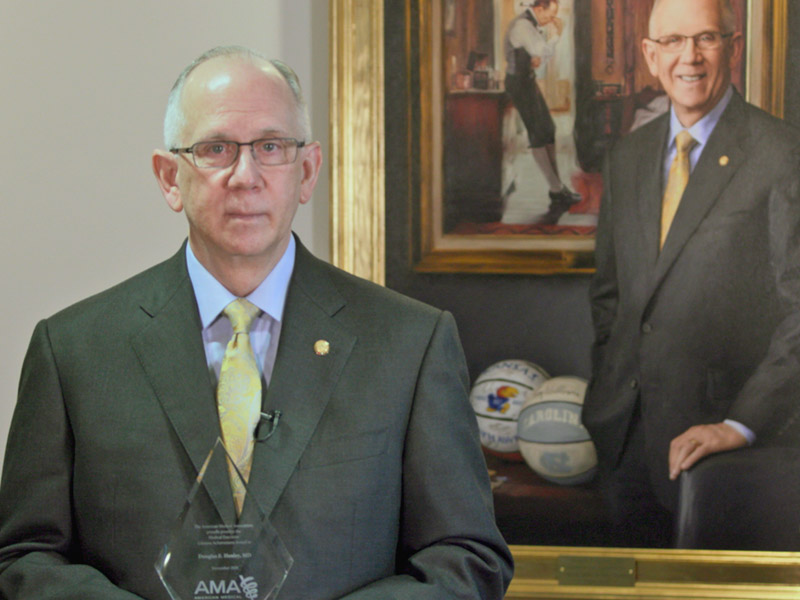AMA Honors Henley With Lifetime Achievement Award
Former Academy EVP/CEO Makes Case for Primary Care Investment
November 18, 2020, 8:40 am David Mitchell -- Former AAFP EVP and CEO Douglas Henley, M.D., was honored with the Medical Executive Lifetime Achievement Award on Nov. 13 during the November 2020 Special Meeting of the AMA House of Delegates.

Given a few minutes to provide remarks during the virtual event, Henley eschewed the opportunity to talk about himself and instead urged the multispecialty audience to consider two issues that defined his career: support for primary care and affordable health care for all people.
Henley shared a slide that charted life expectancy and health care expenditures for roughly two dozen countries since the 1960s. Although its peers have achieved average life spans of 80 years or more, the United States peaked at 79 in 2014 and has declined since.
Henley called the chart “embarrassing.”
So what are other countries doing differently? Henley pointed to three critical factors.
- Since World War II, the other countries have sought to achieve affordable health care for all.
- These other nations, he said, spend an average of $2 on social support services for every $1 spent on health care, compared to the 49 cents the U.S. spends on social services for every health care dollar.
- The other countries financially support their health care systems and organize them around foundational primary care. The United States has not made a similar investment, he said, “despite evidence demonstrating that increasing the number of primary care physicians has a 2 1/2 times greater impact on improving life expectancy when compared to a similar increase in subspecialty physicians.”
The AAFP was the first medical association to call for health care for all in 1989, when Henley was in private practice serving as a delegate in the Academy’s Congress of Delegates. He later championed the concept of health care as a right during his tenure as EVP/CEO. The COD adopted such a policy in 2017, recognizing health as a basic human right for every person, and stating that right includes access to “timely, acceptable and affordable health care of appropriate quality.”
Henley, who also played a role in the Academy’s adoption of policies related to health equity, said during his remarks in the AMA meeting that it’s clear what the path forward is.
“I challenge this house to be bold to achieve affordable health care for all with greater investment in both primary care and social support services to achieve health equity,” he said.
In an AMA news release about the award, AMA Board Chair Russ Kridel, M.D., a facial plastic and reconstructive surgeon from Houston, called Henley “a fierce advocate for family medicine — and an even fiercer advocate for patients.”
Henley’s time in family medicine leadership dates to the 1970s, when he served on the AAFP’s Commission on Legislation and Governmental Affairs as both a student and resident.
During 20 years of private practice in his native state, Henley served nearly a decade on the North Carolina AFP Board of Directors, including a term as president. He also served as an alternate delegate and delegate to the Academy’s Congress of Delegates for several years.
Throughout his time in practice, he trained future family physicians in a variety of teaching roles with his alma mater, the University of North Carolina at Chapel Hill School of Medicine.
Henley served six years on the AAFP Board of Directors in the 1990s, including a year as president, and served on numerous Academy commissions and committees. He also has served on the Board of Trustees for both the AAFP Foundation and the NCAFP Foundation.
The AMA noted in its news release that Henley — who has been an alternate delegate or delegate in the AAFP’s AMA delegation since 1993 — has been a strong advocate for diversity in the physician workforce. In his remarks, Henley praised the House of Delegates for becoming a more diverse body.
Henley retired on Aug. 1 after 20 years as AAFP EVP/CEO. In a nomination letter to the AMA Board of Trustees Selection Committee, (then) AAFP Board Chair John Cullen, M.D., noted that Henley declined to be recognized during the Academy’s recent annual meeting and had also declined to have any programs named in his honor.
“The AAFP Board and the AAFP AMA delegation feel strongly that he should be recognized by both his peers in medicine as well as those in executive leadership for his exceptional life of service to our specialty, the House of Medicine and, most of all, to our shared patients,” Cullen said.
The AMA award recognizes executives who have “contributed substantially to the goals and ideals of the medical profession.”
Cullen said Henley “exemplified servant leadership while shepherding the AAFP through two decades of change and medical transformation” and that the AAFP is “deeply grateful for his leadership, discipline and vision.”
“With politicians, he is alternately humble, humorous and stern, reminding them of the importance of their decisions and how what they do impacts our patients,” Cullen said. “He has a clear-eyed pragmatism in politics, which has served our Academy, the House of Medicine and our patients well and has propelled the AAFP into being one of the most effective organizations in Washington, D.C.”